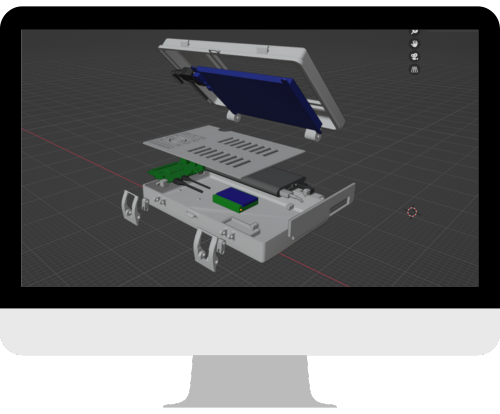
3D – Suitcase for Parkinson’s Disease Diagnosis
This project developed a portable, durable suitcase for the Parkinson's diagnosis helmet, housing essential electronics. In collaboration with the Federal University of Pernambuco and the client, it achieved precise design and manufacturing for a compact, user-friendly system.
Project Features:
Advanced 3D Modeling: Used Blender for a custom suitcase model to hold a 7-inch HDMI display, power bank, Raspberry Pi, ASP32 board, cooling fan, switch, and cabling, balancing functionality and aesthetics for component access and a professional look.
Client Collaboration: Held bi-weekly meetings for feedback and brainstorming, refining the suitcase design iteratively to align with the client's vision.
Electronics Integration: Arranged electronics for efficiency and ease, with a layout ensuring optimal airflow to keep the system cool.
PLA 3D Printing: Selected PLA for its printability, durability, and eco-friendliness, using Cura Software for precise and structurally sound prints, safeguarding electronic components.
User-Centric Design: Added features like a durable handle, secure latches, and precise slots for cables, ensuring easy use and transport of diagnostic equipment.
Technical Specifications:
Software: Blender for 3D modeling and Cura for slicing and 3D printing preparation.
Material: Polylactic Acid (PLA), selected for its durability and eco-friendly properties.
3D Printing Technology: Utilized Fused Deposition Modeling (FDM) technique, known for its effectiveness in creating detailed and durable objects suitable for technical applications.
Components Accommodated: Specifically designed to house a 7-inch HDMI display, Raspberry Pi board, ASP32 board, power bank, cooling fan, on/off switch, and necessary cabling, with consideration for easy access and maintenance.






